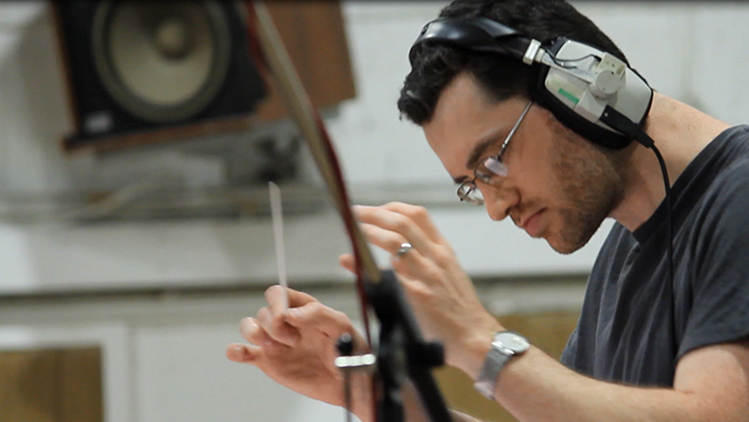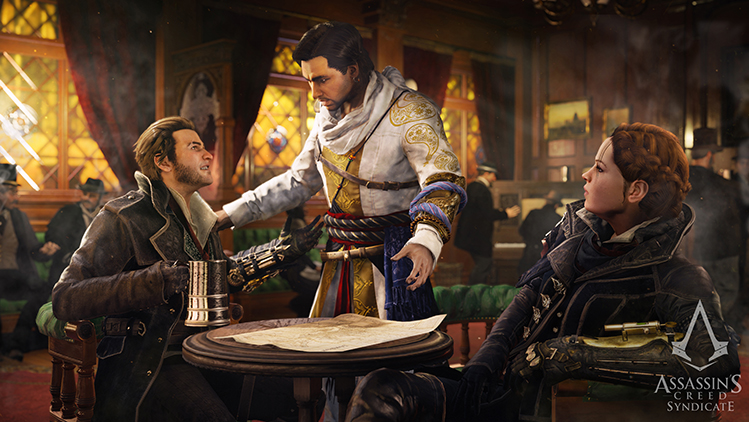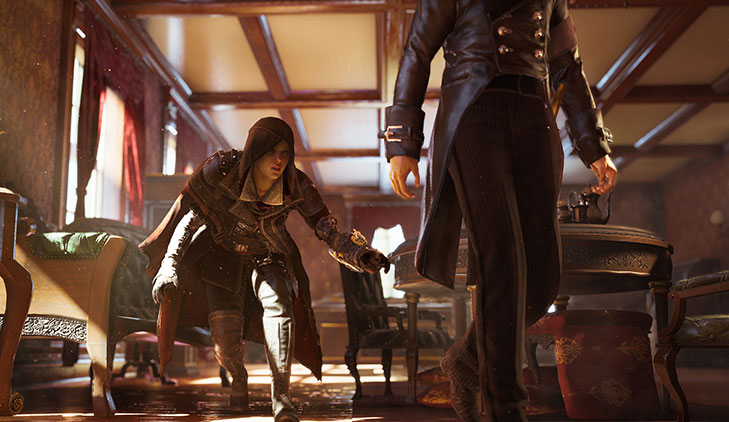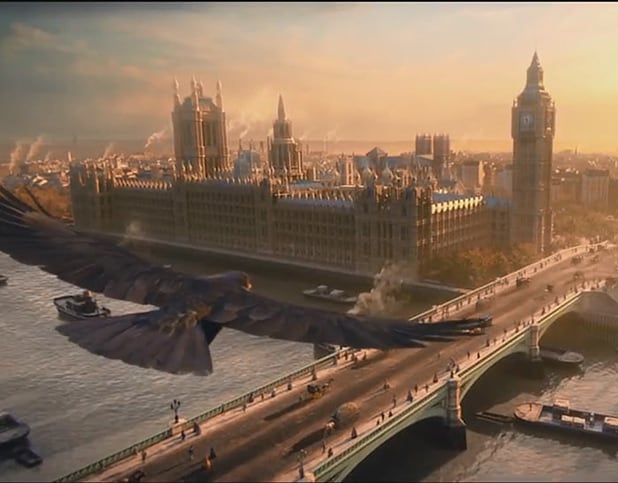For Austin Wintory, the Grammy-nominated composer behind Journey, creating the music for Assassin's Creed Syndicate wasn't about mining historic musical references. Instead, he analyzed its characters - specifically Jacob and Evie Frye, as well as the city of London itself - and let their personalities and attributes help drive the direction and tone of the soundtrack. The end result is a unifying musical theme that permeates Assassin's Creed Syndicate, adding deeper shades of gray to a morally ambiguous setting and cast of characters. We had a chance to talk to Austin about this theme, how it came to him, and what his general process is like for creating music.
>
UbiBlog: How did this whole process for composing the Assassin's Creed Syndicate soundtrack begin?
Austin Wintory: I was very fortunate that when the audio team for Assassin's Creed Syndicate, led by audio director Lydia Andrew, went hunting for a composer, they reached out to me. We'd never met before, so it was a bit of a cold call on their part. I was immediately excited at the prospect, though, as a long-time player of the franchise, but also as someone ever-hunting for new challenges. Lydia wanted to know what my interpretation of the world of Assassin's Creed Syndicate might be, so I threw a curveball her way in the form of a sort of a twisted approach to 19th century chamber music, and to my astonishment she loved it. And so off we went!
UB: How do you approach composing music for a game? Do you have a routine?
AW: I actually don't have much of a routine or composing ritual. I try to vary my approach as much as possible, even including things like driving different routes to my studio each day. I figure if I get too complacent with the background details of my life, my composing efforts might similarly fall into a rut. So I just try to let the game guide me. Ultimately, each game is so different that if you just let it walk you down a path, you're almost guaranteed to end up somewhere you've not been. And going places, musically, I've never been is probably the single aspect of this job I love the most.
UB: Where did you draw inspiration for the Assassin's Creed Syndicate soundtrack?
AW: The score could be attributed to two primary sources of inspiration: the personalities of Jacob and Evie, and the fascinating, contradictory world of Victorian London. With regard to the twins, they have this wonderful confidence, almost arrogance - particularly Jacob. Their mannerisms were a very crucial insight for the music, because it gave us permission to approach the score with a bit of fun and even sarcasm. For these two, a fight against virtually anyone does not represent a genuine life-or-death epic battle. It's more like a cat playing with a mouse, and macabrely enjoying the dance. And that's why you hear the waltzes! I rather obsessively channeled different styles of dance, with the waltz in particular, throughout the score to create that sense of ease - that Jacob and Evie are somehow, in their minds, above anyone who would dare cross them.
The setting, London itself, is also important, but I didn't aspire to create a period score in any real way. It's more that London then was simultaneously this beacon of progress, of the promise of a truly amazing economic future, and yet also home to horrendous cruelties and disenfranchisement. I tried very diligently for the score to try and capture, and even reconcile, those two elements to make London beautiful and grimy at the same time.

UB: Victorian London is a very distinct era in human history with lots of varied interpretations that might not completely fit with the reality of the era. How do you balance being historically accurate versus fulfilling people's expectations of what music sounded like in that era, versus what you think the music should sound like?
AW: I honestly don't think much about what people may or may not know of music at that time. I would be very surprised if any gamer were to say that they expect the music to be authentic as a prerequisite to their enjoyment. And besides, the Assassin's Creed franchise has never really preoccupied itself with that in the past, given the present-day story that couches the individual historical stories. On the other hand, making an arbitrary choice to play against the setting could be quite disruptive. Say I had chosen to score it entirely with avant-garde '60s European electronic music? In that case, I think people would notice and not too flatteringly. So you have to walk the line.
Chamber music of the mid-19th century definitely inspired me, but I did not seek to make the score authentic - at least, aesthetically. One of Lydia's wonderful ideas for the game was the incorporation of legitimately authentic folk tunes and hymns into the score, as melodic fragments you constantly stumble upon. They're heard throughout London and played by various street performers, so it's similar to the sea chanties from Assassin's Creed IV. We saw to it that they bleed rather deeply into the score as well.
UB: Have you listened to any of the previous Assassin's Creed scores? Do you have a favorite?
AW: I have heard them all, some in more detail than others. I must say I was very taken with a number of moments in my colleague Sarah Schachner's work on Assassin's Creed Unity. There's some absolutely delightful writing and performing in there. I also rather liked some of the aggressive writing that Olivier Deriviere did for Assassin's Creed Freedom Cry.

UB: Are there any specific themes or emotional states you want to convey in the music for Assassin's Creed Syndicate? Do you see the soundtrack as having a single, unifying theme or undercurrent?
AW: The score, like most of mine, has a single unifying theme. It's heard in a million different guises throughout the game, sometimes very hidden and other times pretty overtly. I see it as a piece trying to capture the essence of these two twins, good at their heart even if a bit rough in their methods sometimes, and within the framework of this very morally ambiguous Victorian London setting. I call it "Bloodlines."
UB: How has game music changed over the last decade? How has the perception changed?
AW: Culturally we're seeing a lot of growth, and therefore also the attendant growth pains. The industry is struggling with identity right now, and inclusiveness, but I am hopeful that our tent is widening, and our creativity deepening. And I'm happy to say that I don't believe that hope is based on purely wishful thinking either. I see inspiring people working in every corner, from Ubisoft to the smallest indies.
UB: What are some of your favorite instruments to compose for, and were you able to use them in the soundtrack?
AW: I'm a bit of a sucker for string soloists, and I was delighted to work with two world-class musicians for those roles on this one: Sandy Cameron on violin and Tina Guo on cello. I also worked with a staggering group in London for the core ensemble work, consisting of strings and a few assorted winds, all beautifully captured at Abbey Road Studios. At the end of the day, though, I chose those instruments and performers not because I love them, but because they felt right for Assassin's Creed Syndicate. If it had seemed like something boldly brassy was the right idea, as in a score like The Banner Saga, I would have gone that route. So forgive me for dodging the question, but I love every instrument!

UB: Hypothetically speaking, if you were to assassinate someone with a musical instrument from Victorian London, what would you use and why?
AW: If Evie gets a cane sword, does that mean I can have a conductor's baton dagger?
UB: Sounds fair to us! Thanks, Austin.



